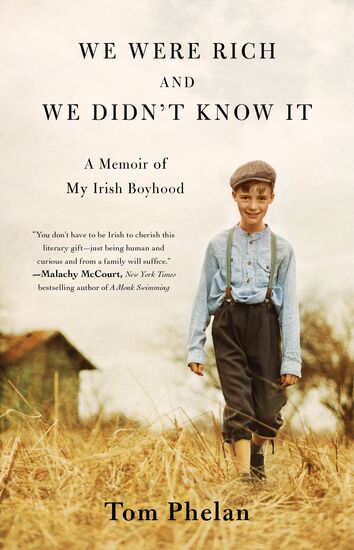Caitlin Doyle has been called a “highly original voice” in American poetry.
By Peter McDermott
Caitlin Doyle can’t remember the exact moment that Irish poetry caught her attention for the first time. But she knows the poem – Oliver Goldsmith’s “The Deserted Village.”
It allowed a grade-schooler on Long Island in the late 20th century to make the leap in time to the Longford of 250 years before
“I read ‘The Deserted Village’ over and over for the pleasure of arriving at his description of the schoolmaster”:
Here, in his noisy mansion, skill'd to rule,
The village master taught his little school;
A man severe he was, and stern to view,
I knew him well, and every truant knew;
Well had the boding tremblers learned to trace
The day's disasters in his morning face.
“By capturing what I felt toward my own teacher at that age, Goldsmith connected me with the way that poetry can transform and mythologize ordinary experience,” she recalled.
Then, a few years on, Doyle came across an anthology of poetry on her parents’ bookshelf.
“Patrick Kavanagh, Louis MacNeice, W.B. Yeats, Arthur O’Shaughnessy caught my ear,” she said. “Though much of their poetry exceeded my full understanding, I sensed in sound what I wasn’t yet able to grasp in substance.”
Now, Doyle is a rising star in American poetry, a “highly original voice,” who appeared a couple of months back on the PBS NewsHour Poetry Series. She’s also capturing some attention in her father’s native Ireland.
Of course, there’s never a shortage of poets and poetry about. For example, “Best New Poets 2009: 50 Poems from Emerging Writers,” published by the University of Virginia, drew on a pool of approximately 3,500 submitted works.
One reviewer wasn’t overly impressed with the ultimate selection, but he picked out a couple of poems that made the volume worth the price of admission. "Thirteen,’ by Caitlin Doyle,” he said about one of them, “which is such a remarkable combination of ideas and word-play around the transformations to a girl in her 13th year that it is like a socks-on-carpet spark to the brain.”
Doyle has been collected in several other volumes, notably “The Best Emerging Poets of 2013,” “The Crafty Poet: A Portable Workshop” and “The Southern Poetry Anthology.” And her work has appeared in a number of publications – the Atlantic, Boston Review, the Threepenny Review, Black Warrior Review and the Cork Literary Review among them.
From north to south
The poet has won or participated in numerous fellowships, scholarships and writer-in-residence posts. They or the sponsoring institutions have had names attached to them like James Merrill, Jack Kerouac, Edward Albee and Tennessee Williams.
But Thomas Wolfe’s has been the most important name so far. Sixty-four years after the novelist’s death, Doyle was chosen as the inaugural recipient of a full four-year undergraduate scholarship in creative writing endowed in his name at the University of North Carolina at Chapel Hill. It is awarded annually in recognition of “exceptional literary ability and promise.”
Doyle noted recently that the author of “Look Homeward, Angel” and “You Can’t Go Home Again” had left North Carolina as a young man to pursue his literary dreams. “As a born-and-raised Long Islander, my path went in the opposite direction, north to south,” she said.
Since graduation, she has taught at several universities around the country, including Boston University, where she got her MFA. Currently, she is pursuing a PhD as an Elliston Fellow in Poetry at the University of Cincinnati.
Meanwhile Doyle has continued to impress with her literary output. Robert Pinsky, former poet laureate consultant to the Library of Congress and one of America’s most prominent poets, has praised her as a young writer “who combines focus and range, feeling and wit.”
“Doyle’s poems are serious and complex, but also witty and playful, and it’s this tension that makes her writing so innovative,” Michelle Aldredge of Gwarlingo.com has said. “[Her work] hovers in the surprising place between music and meaning…although she is a poet and not a fiction writer, she shares Flannery O’Connor and Faulkner’s Southern-gothic flair for unsettling (sometimes comic) domestic scenes.”
Michelle Lewis has praised Doyle’s poetry for its skillful examination of “the merits and dysfunctions of faux worlds that haunt and replace traditional realities.”
Her admirers say that Doyle is particularly good at combining accessibility with complexity. She herself likes to quote T.S. Eliot: “Plot is the bone you throw the dog while you go in and rob the house,” which she interprets as addressing the issue of accessibility. People not involved with poetry in an academic setting have a “desire for connection,” she said. “They want to enter a universe that they recognize. I’m fascinated with exploring how a poem, by fulfilling that hunger within a reader, can gain the ability to slip inside of ‘the house’ and do more complicated work.”
One writer, J. Dee Cochran, has noted that “in contrast to the prevalence of free verse” among many of her contemporaries, Doyle’s poetry “has been recognized for its skillful use of formal elements like rhyme and meter.”
Asked if Irish poetry had any influence in that regard, she said: “The Irish poets I read as a child and adolescent, who so often made lasting word-music through their dexterous use of rhyme and metrical effects, shaped my early love of poetry’s traditional formal capacities.”
Some commentators have detected the immediacy of the Irishness of her background in her poems.
Although Doyle doesn’t directly address it much, she said, “I know that the sense of duality it creates within me informs my work in often surprising ways.”
Literary hangouts
Her paternal grandparents, James and Ann Doyle, were “fiercely nationalistic people,” she said, who both participated in the 1916 Rising. He fought under the command of Eamon de Valera and was interned at Frongoch.
“They both died long before I was born,” Doyle said. “My father says that, when he was growing up, they almost never mentioned the Easter Rising, and they kept their experiences as nationalist volunteers in a private and unspoken realm.”
Her father Sean Doyle, who grew up in the Fairview neighborhood of Dublin, came to the U.S. in the late 1950s. He was in his early 20s and was very soon drafted into the armed forces. After his years of service, he worked in a series of construction jobs, before opening the White Horse Bar on 89th Street and 2nd Avenue. Said his daughter: “Since the joint became a popular spot with artistic and literary folks, he gathered plenty of stories about eccentric writers.
“When he moved to Long Island with my mother to start a family, he got a job as a bartender in Sag Harbor at the American Hotel, another place known for drawing literary types,” she said. “He worked there for much of my childhood. I grew up steeped in his tales about the novelists, poets, screenwriters, playwrights, and journalists who came into the White Horse and the American Hotel.
Sean Doyle, left, tending an Upper East Side bar that was
favored by literary and artistic types in 1960s Manhattan.
“My father’s stories about writers, combined with his own passion for words, fed my burgeoning fascination with books,” added Doyle, whose parents and two older brothers, as well as extended family members, still live on Long Island. “He grew up during a time in Ireland when the study, memorization and recitation of poetry comprised a significant part of the primary school system. It wasn’t uncommon to hear him speak lines of poetry aloud around the house, and my experience living with poems in the air as a kid imbued language with a highly-charged energy.”
Although Doyle has yet to spend time studying or teaching in Ireland, she has enjoyed working with poets of her own generation who have traveled to the U.S. She felt a “jolt of excitement” when participating with Annemarie Ní Churreáin at the Literature Out Loud Series in Florida in 2014 (both women have served as writer-in-residence at the Jack Kerouac House in Orlando). “I admire the combination of lyrical intensity and skillful understatement in her work,” Doyle said.
Darkening thrill
Some of the best work by younger Irish poets has yet to reach book format, she said, but can be found in literary magazines.
Her “touchstone” Irish poem, however, which “captivated my imagination with special force,” was long ago collected, written as it was by someone who died in 1963.
“If readers want to experience language as a pleasure, an ache and a darkening thrill, I’d recommend diving into MacNeice’s ‘Bagpipe Music.’
“It’s one of the first poems that obsessed me during my high school years, and it has remained a focal point in my relationship with poetry,” Doyle said.
MacNeice wrote it the late 1930s after a visit to the Western Isles of Scotland. On the surface a “nonsense poem,” he said (in an audio explanation and recitation available on YouTube), it deals with the “cultural decline of the highlands and islands of Scotland” at that time and the “clash between this dying folk culture and the new slick urban culture, which is bound to supersede it.”
Doyle said: “I’ve long marveled at how the poem’s rhythm, a mixture of harmony and dissonance, gathers an unnervingly addictive momentum before arriving at the chilling final stanza.”
She has had the opportunity to recommend such work in her role as a teacher.
“As the writer-in-residence at two college preparatory schools, St. Albans School in Washington, DC, and Interlochen Arts Academy in Interlochen, Mich., I designed and taught creative writing classes for talented high-school writers,” Doyle said. “The pleasure and challenge of connecting teenagers with poetry’s mysteries invigorated my relationship to the art in fresh ways. It’s a privilege to be able to enliven language for young people before they’ve fully developed the kind of resistances to poetry that many adults possess.
“During my time as the emerging writer-in-residence at Penn State, I had the opportunity to design a class centered on poetry and screenwriting,” she continued. “That remains a formative teaching experience for me because I discovered how much the close study of filmic elements can enhance students’ understanding of craft issues in poetry.”
Doyle said: “I hope to guide students toward protecting the place within them that writes, above all, for pleasure, so that their process doesn’t become overly fraught with other pressures.
“I’ve always considered it important to emphasize that, if a student can’t locate reasons to write beyond external validations and rewards, he or she likely won’t sustain a passion for the process,” the poet said. “My hope is that instilling this idea in beginning writers will help them weather the discouragements, failures, and rejections that will eventually touch even the most gifted among them.
“When they enter my classroom,” Doyle said, “one of my goals is to help them reach a place where words can befriend and beguile them again."
Scroll to Aug. 29 at www.pbs.org/newshour/poetry/ for “Poet explores the explosive potential of the bikini.” And for more on Caitlin Doyle, go to www.caitlindoylepoetry.com and check out readings and interviews with her on YouTube.









